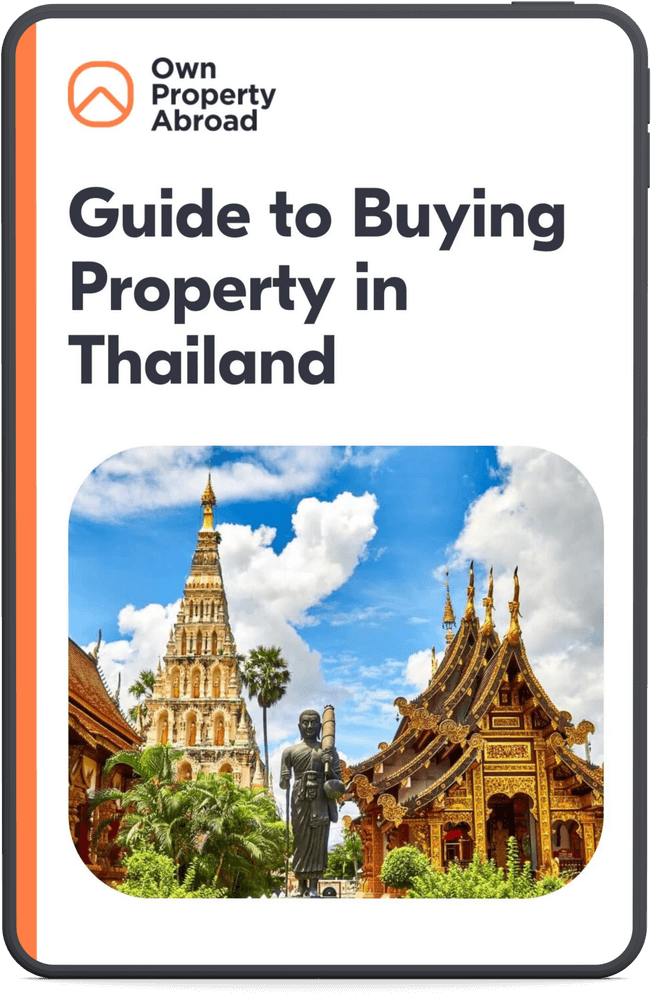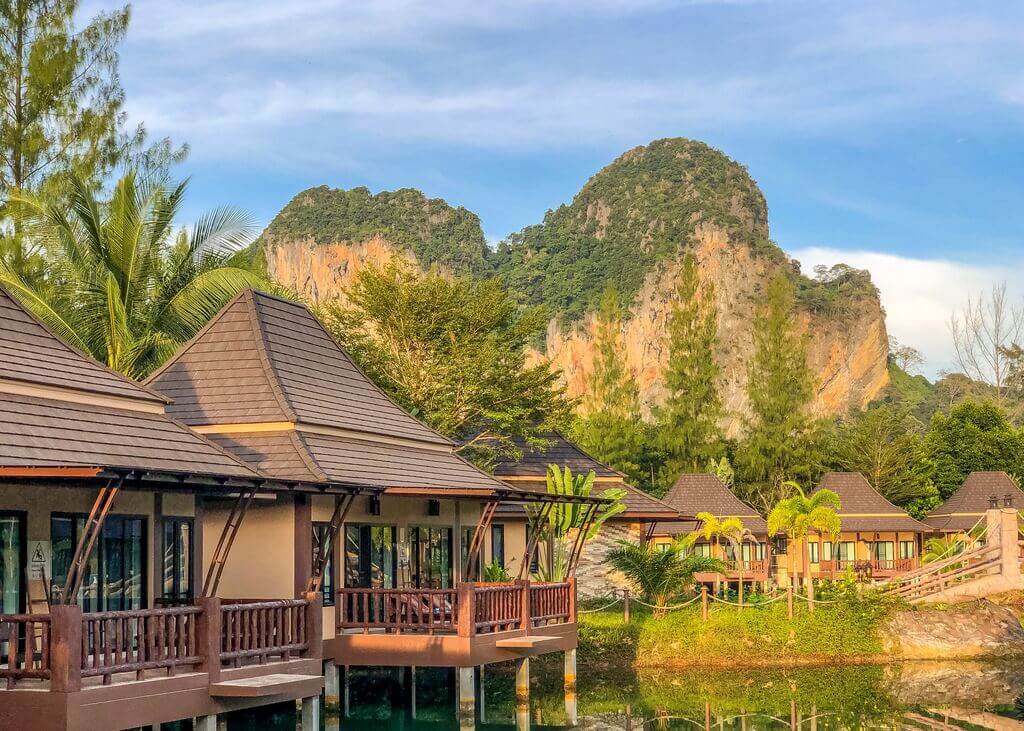Overview of the real estate market in Thailand
Thailand’s real estate market in 2025 is showing signs of resilience and growth. Condo prices in Bangkok are averaging around ฿ 135,000 ($4,015) per square meter, reflecting a 5% increase from the previous years. The new real estate law in Thailand allows up to 99-year leases and up to 75% foreign ownership in condos, making the Thai market more accessible to international buyers.
While the overall market growth is slow, it’s supported by economic improvements and substantial infrastructure developments, such as new transportation projects and urban expansions. This stability makes Thailand a popular destination for holiday home buyers and real estate investors looking for long-term property appreciation.
Valuable insights and practical advice, distilled from years of expertise and real-world experience.


Can foreigners buy property in Thailand?
Foreigners can buy property in Thailand, but there are specific regulations and rules to follow. Foreigners cannot own land directly but can buy condos or lease property and land long-term. Foreigners married to Thai citizens may have the opportunity to purchase property, with the land registered in the spouse’s name. The recent law change permits up to 75% foreign ownership in condos, making it easier for foreigners to buy a house in Thailand.
There are several options to buy property in Thailand as a foreigner:
- Condominiums: Foreigners can buy condo units in Thailand, provided that the foreign ownership in the whole building does not exceed 75%. This is the easiest method for foreign property ownership in Thailand.
- Long-term leases: Foreigners can lease land for up to 99 years. This method allows property development on leased land, making it suitable for both personal and investment purposes. The lease agreement should be carefully reviewed and registered with the Land Department to ensure its validity.
- Company ownership: Foreigners can set up a Thai company and hold 49% of the shares to buy land through the company. The company must comply with Thai laws and regulations, and this method requires thorough legal and financial planning to maintain compliance.
- Marriage to a Thai citizen: Foreigners married to Thai citizens can have land registered in their spouse’s name. The Thai spouse must declare that the purchase is made with their funds, and the foreign partner must not have claims to the land.
How can foreigners buy land in Thailand?
Foreigners cannot directly own land in Thailand, but alternative options exist. One option is to lease land for up to 99 years, which allows for long-term use and development. Foreigners are allowed to lease land and build their own house on top of the land.
Another method foreigners can buy land in Thailand is through a Thai company where foreigners can own up to 49% of the shares. This company can then purchase the land. Lastly, foreigners can invest in the Broad of Investment (BOI) promoted projects, which sometimes allow foreign land ownership in Thailand.
Best places to buy property in Thailand
Thailand offers diverse locations that are ideal for different lifestyles and investment goals. Here are some of the best places to buy property in Thailand, each offering unique benefits.
- Bangkok: Ideal for professionals and foreigners looking for real estate investment in Thailand, as Bangkok is a city full of modern amenities, business opportunities, and cultural heritage. Bangkok attracts expats, young professionals, and business travelers seeking a dynamic urban environment. Property prices in Bangkok vary widely, with condos averaging around ฿ 134,820 ($4,010) per square meter.
- Phuket: Perfect for retirees and holiday home buyers, as Phuket is known for its beautiful beaches, luxury resorts, and exciting nightlife. Phuket provides a relaxed lifestyle with a strong expat community, attracting those seeking both leisure and adventure in a tropical paradise. Average condo prices in Phuket are around ฿ 96,285 ($2,864) per square meter.
- Chiang Mai: This city in the north of Thailand is great for those seeking a peaceful and culturally rich environment, as Chiang Mai combines historical charm with a laid-back atmosphere. It’s popular among digital nomads, retirees, and expats, offering a slower pace of life surrounded by nature and history. Condos in Chiang Mai typically cost around ฿ 60,470 ($1,798) per square meter.
- Pattaya: Suitable for those looking for a lively beach city, Pattaya offers great nightlife and beach activities. It attracts tourists, expats, and retirees, providing a vibrant social scene with affordable living options. Property prices in Pattaya average around ฿ 70,628 ($2,100) per square meter.
- Hua Hin: This city boasts a quieter coastal environment with good infrastructure, international schools, and golf courses, making it the perfect location for families and retirees. Hua Hin offers a family-friendly atmosphere and attracts a mix of locals and foreign residents seeking a peaceful coastal lifestyle. Average condo prices in Hua Hin are around ฿ 53,553 ($1,593) per square meter.
- Koh Samui: The popular Thai island is best for luxury seekers and holiday homeowners, as Koh Samui is known for its resorts, beaches, and beautiful nature. It draws tourists and high-end property buyers looking for exclusivity and luxury in a tropical setting. Condo prices in Koh Samui average around ฿ 61,880 ($1,840) per square meter.
How to find a property for sale in Thailand?
Foreigners can find properties for sale in Thailand through various effective methods, including working with real estate agents and exploring property websites. Each approach offers unique advantages and considerations.
Real estate agents
Real estate agents in Thailand can provide valuable local expertise and personalized service. They have access to a wide range of properties and can offer insights into the best locations and current market trends. Agents can also assist with legal requirements and negotiations, making the buying process smoother. Choosing a reputable real estate agent with a good track record is essential to ensure a successful transaction.
Property websites
Property websites are an excellent resource for finding properties for sale in Thailand. These platforms allow you to browse listings at your convenience, filtering by location, price, and property type. Websites often include detailed property descriptions, photos, and contact information for sellers or agents. Popular property websites in Thailand include DDproperty, FazWaz, and Hipflat. Using these sites can help you get a broad view of the available real estate in Thailand for foreigners and compare options before making a decision.

6 steps to buying a property in Thailand as a foreigner
Foreigners can buy property in Thailand by following the six steps below.
Step 1: Research and planning
Begin by understanding Thailand’s property market, foreign ownership laws, and rules for property investment in Thailand. Foreigners can own up to 75% of a condominium building and lease land for up to 99 years. Determine your budget, preferred locations, and property type. Use resources like market reports and local real estate news to stay informed about trends and property values.
Step 2: Find a property in Thailand
Utilize both real estate agents and property websites. Agents provide local market knowledge and access to exclusive listings. Websites like Own Property Abroad, DDproperty, FazWaz, and Hipflat allow you to browse properties, compare prices, and gather information on different neighborhoods. Schedule visits to shortlisted properties to assess their condition and suitability.
Step 3: Legal consultation
Hire a reputable lawyer experienced in Thai property law. The lawyer will conduct due diligence, including verifying the property title, checking for encumbrances, and ensuring compliance with Thai real estate law. Legal advice is crucial to avoid potential scams and ensure a smooth transaction. Your lawyer can also help navigate the complexities of the purchasing process and provide guidance on tax implications.
Step 4: Make an offer
Once you find a property, make a formal offer through your lawyer. The offer should include the proposed purchase price, payment terms, and any conditions (e.g., inspection or financing contingencies). If the seller accepts, you will sign a reservation agreement and pay a deposit, usually 1-2% of the property price. This agreement secures the property and outlines the terms and conditions of the sale.
Step 5: Due diligence and contracts
Your lawyer will perform detailed due diligence, including a title search, reviewing the sale and purchase agreement, and checking for outstanding debts or legal issues. After satisfactory due diligence, both parties sign the sale and purchase agreement. The contract should clearly outline the terms of the sale, including payment schedules, handover date, and responsibilities of each party. Pay the agreed deposit, typically 10% of the property price, to secure the agreement.
Step 6: Transfer of ownership
Complete the final payment and transfer ownership at the Land Office. Both buyer and seller, or their representatives, must be present. Pay any applicable taxes and fees, such as transfer fees (usually 2% of the appraised value) and stamp duty. The property is then registered in your name, and you receive the title deed. Ensure that all documents are correctly signed, certified, and filed with the appropriate authorities to finalize the transaction and secure your ownership.
Requirements for property ownership transfer
To transfer property ownership in Thailand, the Land Office requires the following documents are required:
- Title Deed of the property (Chanote).
- Certification of No-Debt.
- Copies of passports or identification documents of both the seller and the buyer.
- Copies of the immigration stamp in the foreign party’s passport.
- Foreign Exchange Transaction Certificate: Commonly known as Thor Thor 3, it is issued by banks to foreign parties upon receiving foreign currency in a foreigner’s Thai bank account. This certificate is mandatory for complying with government regulations when remitting funds from overseas to purchase a condominium unit in Thailand.
- Company documents from the past three months (if bought through a Thai company).
Thailand property prices
The average cost of a house in Thailand ranges from ฿ 3.64 million ($108,224) to ฿ 5.09 million ($151,513), with an average of ฿ 144,832 ($4,307) per square meter. However, the house prices in Thailand differ and depend on the location, size, materials, property type, and several other factors. The table below gives an overview of the current condo prices in Thailand for Bangkok, Phuket, Chiang Mai, Pattaya, and Koh Samui.
| Type | Median price | Median price/m2 | Annual growth | Median rent price |
|---|---|---|---|---|
| Condo in Bangkok | ฿ 7.01 million ($208,419) | ฿ 134,820 ($4,010) | + 5% | ฿ 31,555 ($938) |
| Condo in Phuket | ฿ 6.08 million ($180,708) | ฿ 96,285 ($2,864) | – 1% | ฿ 45,835 ($1,363) |
| Condo in Chiang Mai | ฿ 2.76 million ($82,204) | ฿ 60,470 ($1,798) | + 12% | ฿ 15,620 ($465) |
| Condo in Pattaya | ฿ 3.77 million ($112,267) | ฿ 70,628 ($2,100) | + 4.5% | ฿ 22,564 ($671) |
| Condo in Koh Samui | ฿ 3.88 million ($115,478) | ฿ 61,880 ($1,840) | – 22% | ฿ 33,724 ($1,003) |
Fees and property taxes in Thailand
When buying a property in Thailand, be aware of the following related costs and taxes:
- Transfer fee: This is usually 2% of the appraised value and is paid at the Land Department during the transfer of ownership.
- Stamp duty: The stamp duty is generally 0.5% of the appraised value. However, this fee only applies if the specific business tax is not applicable.
- Specific Business Tax (if applicable): If the property is sold within five years of ownership, a 3.3% SBT is applied to either the selling price or the appraised value, whichever is higher.
- Withholding tax (if applicable): For individuals, this tax is calculated based on the appraised value and the length of ownership. For companies, it is 1% of the selling price or the appraised value, whichever is higher.
- Legal fees: Hiring a lawyer for due diligence and contract review typically costs around 1-2% of the property price.
- Agent fees: If using a real estate agent, their commission is usually between 3% and 5% of the property price, typically paid by the seller but sometimes negotiated otherwise.
Understanding these fees ensures better financial planning and avoids surprises during the buying process.
Pitfalls and risks of buying property in Thailand
Buying property in Thailand as a foreigner can be risky if you’re not careful. Common pitfalls include scams such as fake land titles, off-plan property fraud, and exaggerated promises from developers. These risks can lead to financial losses and legal troubles. The most common pitfalls and risks of buying property in Thailand are:
- Fake land titles: Scammers may sell properties using forged documents. Always verify the title deed at the Land Department to ensure its authenticity.
- Off-plan property scams: Developers might promise more than they deliver. Verify the developer’s track record and ensure all promises are in writing.
- Foreign-targeted fraud: Foreigners may be targeted with deals that are too good to be true. Always be skeptical of unusually low prices or high returns on investment.
It’s possible to avoid these common risks and pitfalls by always hiring a reputable lawyer to conduct thorough due diligence, using well-known and trusted real estate agents who have a good track record, ensuring that all transactions comply with Thai property laws, and visiting the property in person to verify its condition and the surrounding area.
Expert assistance for foreigners buying property in Thailand
Navigating the process of buying property in Thailand as a foreigner involves understanding complex legal requirements, compliance regulations, and finding the perfect property. Our experienced team is here to guide you through every step of the process, from legal advice to property selection and finalizing the sale. Whether you’re looking for a vacation home or an investment, we offer personalized support to ensure a smooth and secure property purchase. You can also email us at [email protected] for more detailed inquiries and specialized assistance. Contact us today to make your property purchase in Thailand hassle-free and successful!
Valuable insights and practical advice, distilled from years of expertise and real-world experience.


Frequently Asked Questions (FAQs)
Can expats buy property in Thailand?
Yes, expats can buy property in Thailand. They can purchase condominiums or lease land long-term but cannot own land directly. Recent laws allow up to 75% foreign ownership of condo buildings.
Can Americans buy property in Thailand?
Yes, Americans can buy property in Thailand. They can own condos and lease land for up to 99 years, but direct land ownership is not permitted.
Is real estate investment in Thailand for foreigners allowed?
Yes, foreigners in Thailand are allowed to invest in real estate. They can buy condos, lease land long-term, or invest through a Thai company.
What is the cheapest place to buy property in Thailand?
Chiang Mai and Hua Hin are cheaper places to buy property in Thailand, offering affordable options and a relaxed lifestyle.
How much do I need to buy a house in Thailand?
Buying a house in Thailand typically requires at least ฿ 3 million ($89,220) to ฿ 5 million ($148,700), depending on the location and type of property.
Is buying property in Thailand a good investment?
Yes, buying property in Thailand can be a good investment due to its growing economy, tourism industry, and recent legal changes favoring foreign buyers.
What are the rules for foreigners buying property in Thailand?
Foreigners can buy condos (up to 75% foreign ownership), lease land for up to 99 years, or purchase land through a Thai company. Legal consultation is essential to navigate these rules.





One Response
The information is very clear and concise I’m interested in long-term prospects of investing in Thailand.